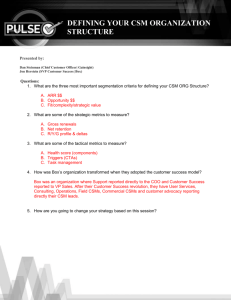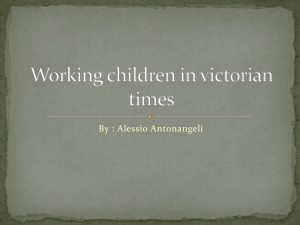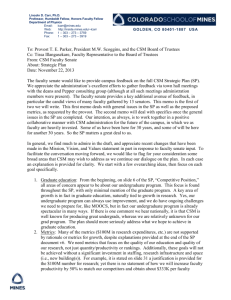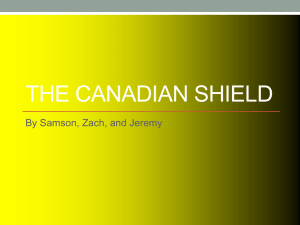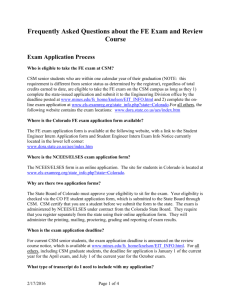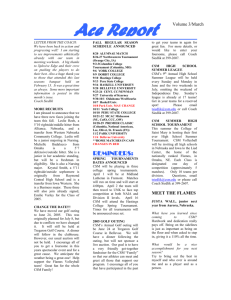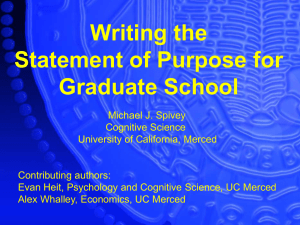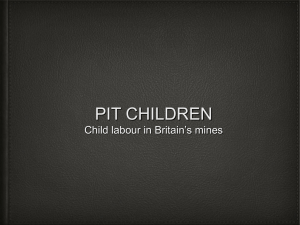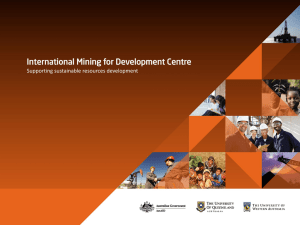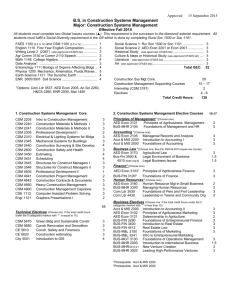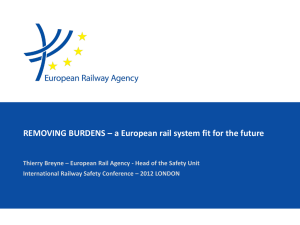General Professional Skills, Leadership/Team Building
advertisement
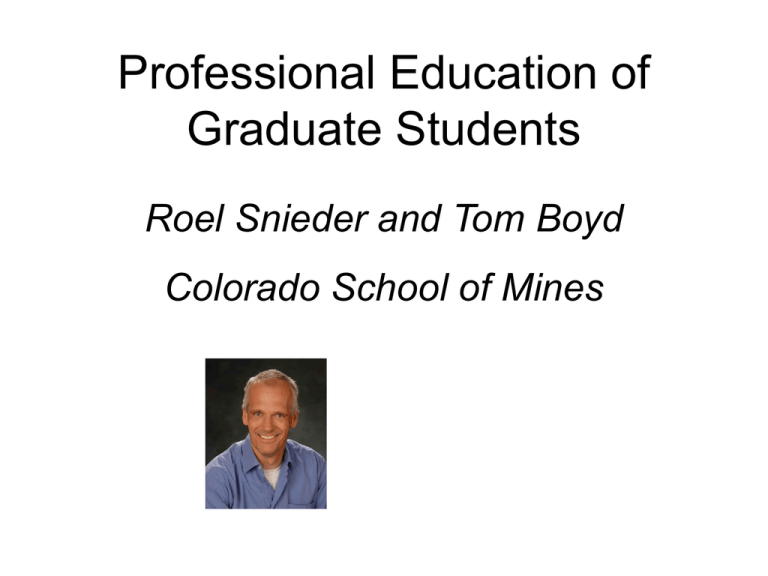
Professional Education of Graduate Students Roel Snieder and Tom Boyd Colorado School of Mines Quotes “It amounts to this: Graduate school is professional school, but most PhD programs badly neglect graduate students' professional development. We spend years of their training ignoring that development, and then, only at the last moment when students are about to hit the job market, do we attend to their immediate professional needs.” (Cassuto, Chron. Higher Education, January 10, 2011) Quotes “The Institute identified a broadly articulated dissatisfaction with the attention trainees receive. One of the principal deficits was said to be in mentoring. NIGMS asserts that training is an intentional, not incidental, endeavor, and that the process of guidance and teaching need not diminish research productivity.” (Draft NIH report “Investing in the future”, 2011) 4 (American Institute of Physics initial employment surveys, classes of 2007 and 2008) What skills do you think are important for graduate students? Topic “Very Unimportant” or “Unimportant” “Important” or “Very Important” Professional writing 3% 97% Oral communication 5% 95% Conflict resolution 16% 84% Negotiation 12% 88% Multicultural issues 25% 75% Ethics 10% 90% Leadership 10% 90% Literature survey 20% 80% Teamwork 7% 93% All skills 12% 88% (From a survey among 155 graduate students at CSM) What is the best method to gain experience? Topic Classes, courses, seminars or workshops Advisor Professional writing 94% 6% Oral communication 90% 10% Conflict resolution 87% 13% Negotiation 81% 19% Multicultural issues 95% 5% Ethics 87% 13% Leadership 93% 7% Literature survey 81% 19% Teamwork 93% 7% All skills 89% 11% (From a survey among 155 graduate students at CSM) Course: The Art of Science Taught at CSM since 2002 Attracts about 60 students/year Required by some departments What is science? Yes, science is based on logic, but it moves forward rather in fits and leaps, making ample use of intuition. The advisor and thesis committee Choose carefully, and develop a good working relationship. Questions drive research In order to find an answer, you need to know what the question is. Time management We set priorities so that circumstances and others don't make the choices for us. Writing proposals Know what reviewers and program managers are looking for. Some ideas for faculty develop a course broaden disciplinary courses create reading group/seminar mentor more broadly Student response “The Art of Science was an eye opener for me. It made me think of my career and my life differently. It gave me energy and ideas to restart and continue when I am stuck.” (Eman Yahyn Al-Juraib) Student response “I am glad I found this course early in my academic career. If only my university had required faculty members to come to your class! Thank you for putting all the things together which otherwise probably would have taken me years and many unfortunate incidents to figure out.” (Anonymous student at KAUST) Teaches practical skills for doing research. Provides a sample curriculum of a course for graduate students. Provides clear advice on career development. For more information: http://www.mines.edu/~rsnieder Course: Introduction to Research Ethics Taught at CSM since 2010 Attracts about 60 students/year Required for students financed by NSF On what foundation do I build ethical principles? What is the noble purpose of my work? “We must learn to distinguish between purpose and meaning in life .... Purpose has something to do with being productive and setting goals and knowing what needs to be done and doing it. It is easy to have purpose… Meaning on the other hand, depends on asking myself who will care and who will profit and who will be touched and who will be forgotten or hurt or affected by my doing these things. Purpose determines what I will do with this part of my life. Meaning demands to know why I'm doing it and with what global results.” (Chittister, 1991) What do I want to grow? What is the noble purpose of my work? Student response “I was pleasantly surprised to discover that the instructors really challenged students to critically assess personal motives for conducting their research.” (Tom Meuzelaar) Classes at the Colorado School of Mines The Art of Science Introduction to Research Ethics Fundamental of College Teaching Academic Publishing Professional Oral Communication Advanced Science Communication Integrating into the Mines community Current courses at CSM The Art of Science Fundamentals of College Teaching Academic Publishing Professional Oral Communication Introduction to Research Ethics Advanced Science Communication Integrating into the Mines community Center for Professional Education cpe.mines.edu Wish-list for courses at CSM Negotiation Conflict management Budgeting (create, manage) Leadership and management Emotional intelligence (as a course?) Some benefits of a Center of Professional Education Educate more complete graduates Advertise CSM (recruit the best students, faculty and employers) Satisfy requirement of funding agencies Ease the task of advising Support synergistic activities on campus Challenges Achieve behavioral change Get student/faculty buy-in Acquire resources (time!) Advantages for students minimize frustration and loss of time increase scientific output and quality be a better collaborator communicate research more effectively be better prepared for job market and … be a better scientist! Advantages for faculty students are more efficient smaller workload as supervisor attract better students fulfill requirement of funding agencies Questions, comments? Roel Snieder rsnieder@mines.edu www.mines.edu/~rsnieder Advantages for sponsors access to broadly educated graduates use short courses for training advertise interest in broad employees http://cpe.mines.edu What is the best method to gain experience? Topic Special classes Regular courses Seminar, workshops Advisor interaction Professional writing 26% 45% 17% 6% Oral communication 21% 43% 20% 10% Conflict resolution 10% 13% 46% 13% Negotiation 10% 12% 45% 19% Multicultural issues 7% 21% 46% 5% Ethics 15% 30% 35% 13% Leadership 8% 20% 53% 7% Literature survey 15% 38% 20% 19% Teamwork 3% 50% 31% 7% All skills 12% 30% 35% 11% (From a survey among 155 graduate students at CSM)
